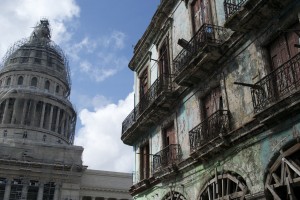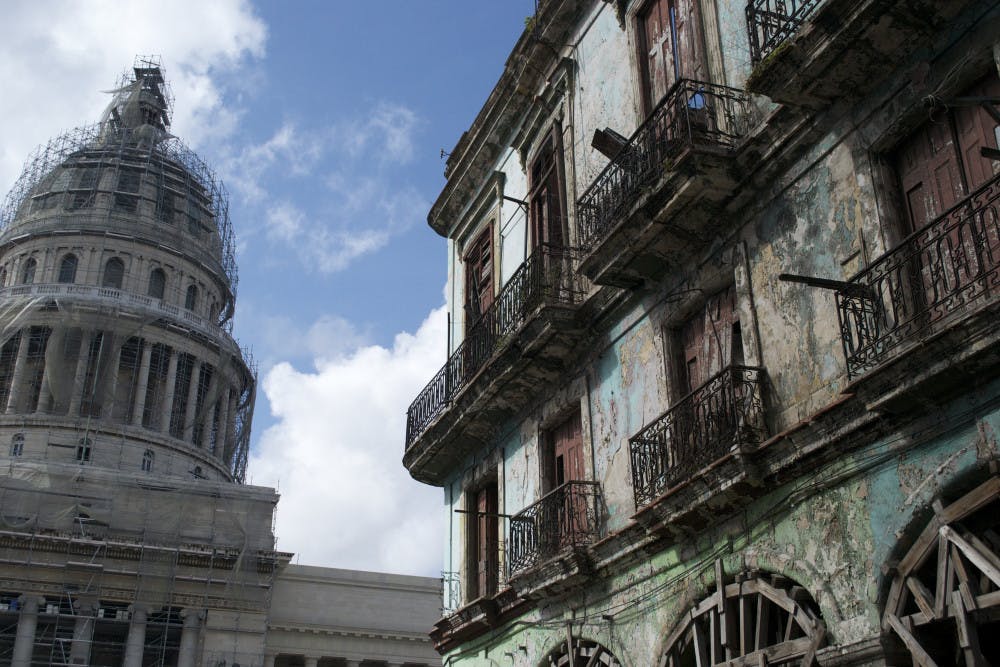By Sydney Shaw
News Editor
For the first time in the College’s history, 23 students spent a winter session in Havana, an epitome of the burgeoning thaw in American-Cuban relations.

The trip occurred just a month after President Obama ordered the restoration of full diplomatic relations with the island and the opening of an embassy in Havana in a surprise announcement that outlined plans to stamp out the last remains of Cold War tensions.
Students were immersed in the culture of Cuba’s capital city from Sunday, Jan. 5, to Saturday, Jan. 18, for the class “Landmarks: Art and Culture of Cuba,” a visual arts and art history collaboration. These two weeks consisted of salsa dance classes, trips to museums, cultural scavenger hunts and exploring famous edifices around the city. The trip also presented students with a view of Cuba’s past and present that has persisted, largely unchanged, for several decades.
“It’s pretty incredible to think that we were some of the last people to see Cuba as it has been for over half a century,” said Christine Garrity, a senior secondary education and Spanish double major who attended the trip.
Dr. Lois Fichner-Rathus, professor of art history, was instrumental in initiating the project. She went on the trip as program director, along with associate art professor Anita Allyn and art professor Elizabeth Mackie.
“My favorite part was probably the trip we took to a farm called Finca La Coincidencia,” Garrity said. “The farm was huge, and apart from harvesting crops, it also served as a sort of outdoor art exhibit that hosted all different types of pieces from a number of different artists.”

Students decorated ceramic pots at the farm to bring back to the states — with a promise, however, that they would one day return to the farm to redisplay the pots.
“It really was just a lovely and serene place to be,” Garrity said.
According to Garrity, many Cubans hope Obama’s words are not simply sweet sentiments, but will bring about real change and help transition the country into the 21st century.
“Cuba is so advanced in terms of taking care of its people, especially in educating them, and yet internet is practically impossible to come by,” Garrity said. “When you have (internet), it takes five minutes to load every page. And there are medicinal shortages, as well. The embargo that the United States has put on Cuba has hurt the people more than the government.”
According to students, there is a billboard in Havana that reads, “The embargo: the longest genocide in history.”
“Educational activities may be conducted despite the current trade embargo with Cuba, but these activities are monitored quite strictly, and CIEE (Council on International Educational Exchange) must have a license from the U.S. government to support our program there,” director of Center for Global Engagement Jon Stauff said.
According to Stauff, students flew to Miami, Fla. on Sunday, Jan. 4. From there, they flew to Cuba on special charter flights arranged according to the rules set by the U.S. Department of the Treasury, which regulates the flow of people between the U.S. and Cuba.
As tensions ease, it is anticipated there will be fewer restrictions on travel, banking and intergovernmental activity between the United States and Cuba in the future. The embargo has yet to be officially lifted by Congress, but Obama has continued to lay the foundations for its repeal.
“When what you’re doing doesn’t work for 50 years, it’s time to try something new,” Obama said during his State of the Union address on Tuesday, Jan. 20. “Our shift in Cuba policy has the potential to end a legacy of mistrust in our hemisphere, removes a phony excuse for restrictions in Cuba … and this year, Congress should begin the work of ending the embargo.”
“I’ll be happy to see (the embargo) end so that students can get the materials they need and Cuba can better begin to connect with the world,” Garrity said.







